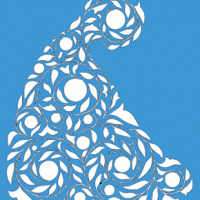
© Latifa Spiker
There are times in life when we are moving forward fulfilling our vision, and then there are other times when we take an account of where we are. We reach a certain point when we must assess what we have accomplished, what we have learned, and what are the results of a particular period of time.
One of the most important practices on the Sufi Path is “muhasabah,” which we can translate as retrospection, assessment, accounting, or reckoning. When you finish a meal in a restaurant in Turkey, for instance, you get the “hisab,” or what we call in English the bill. The tri-literal root of the word (hsb) has to do with accounting. Muhasabah, of course, is more than paying the bill, but that is part of it.
Whether you make known what is in your souls or hide it,
God will bring you to account for it.
[Qur’an 2: 284]
If we could see ourselves objectively we would be aware of how we have spent our lives, what debts (or karma) we have created, and what we need to do to “pay” for our actions and our lives. Actually, if we were wise, we would engage in this retrospection every day, assessing our actions, our emotions, and our thoughts.
Some people are by temperament or conditioning extremely self-critical, while others are not self-critical enough. A good psychologist might recommend that we observe our bodily sense, a sense of contraction that comes with this unhealthy blaming, and through that to acknowledge what needs to be acknowledged in order to move to that higher level of acceptance from which real change is possible.
Most of the time most human beings are seeing their lives through the criteria of the desires of the ego—in other words, in terms of what gives us pleasure, or fulfills our vanity and pride. The spiritual seeker, however, is living for something greater. A spiritual seeker measures with the heart, in the light of perfection contained within the heart, which we call Spirit, or Ruh. True Muhasabah is possible when we are in a state of presence, not lost in the labyrinth of self-blame. Muhasabah is seeing from a higher level of compassionate conscience not neurotic self-condemnation.
Now returning to the idea of assessment, there is the daily assessment, the yearly assessment, and longer cycles of time, and the final assessment that comes at the end of a life, an assessment we should never forget. Divine revelation reminds us of this ultimate assessment, which the ego may find rather inconvenient or disturbing.
What makes Muhasabah difficult is that our perception is caught in a web of “wahm,” or relative delusion. We are deluded by the many strategies of the ego, strategies that ignore the highest values that are not easy for the ego to believe in and depend on. The ego is continually calculating its own best advantage, while the Spirit calls us to act unselfishly, without thinking of ourselves too much. The call of Spirit is even likely to seem irrational. The self-sacrificing generosity of love does not make sense to the practical minded ego.
Muhasaba is difficult because the web of delusion that distorts our perception is not completely lacking a vision of goodness and beauty. Our everyday desires do have something to do with a deeper yearning even if these desires are colored in condition by lesser motives. Our desires are not necessarily evil, but shortsighted, trivial, incomplete. Their banality can only be glimpsed from the perspective of higher truths. Only then can their poignant insufficiency be revealed.
To follow the call of Spirit is to cooperate with the miraculous. The highest values have an element of the miraculous about them. When we can give ourselves over to complete trust, unqualified generosity, unconditional love, it seems as if something in nature conspires to support us.
It is true that the ego would like to appropriate the miraculous for itself—this is what many self-help programs attempt to do. But what is truly miraculous requires that the ego become nothing, and surrender to Truth, the Real, al Haqq.
If we engage sincerely in Muhasaba we are progressively dismantling the false self. We are becoming free of reaction and negativity. Every night we can look at our day and ask ourselves: Have I been patient? Have I been non-judgmental? Have I been just? Every day we replace selfishness with generosity, resentment with patience, self-importance with humility, partiality with impartiality, judgment with compassion, and so be liberated from the toxicities of the ego.
Muhasaba attracts the Divine Mercy and atones for our mistakes. The universe has a way of rushing to support the one who in all humility calls out for help; while the one who is self-satisfied, who justifies the lies of the false self, is erecting a huge barrier to Divine Mercy.
Yet it is not efficacious to become compulsive or neurotic about self-reckoning. Muhasaba can be a friendly coach, developing conscience in us by small, progressive steps. Self-observation can be a companion on the way, helping us to make our tomorrow better than our yesterday.
O you who keep the faith be conscious of God and observe your responsibility to him. And let every soul consider what it has prepared for tomorrow.
[Qur’an 59:18]

